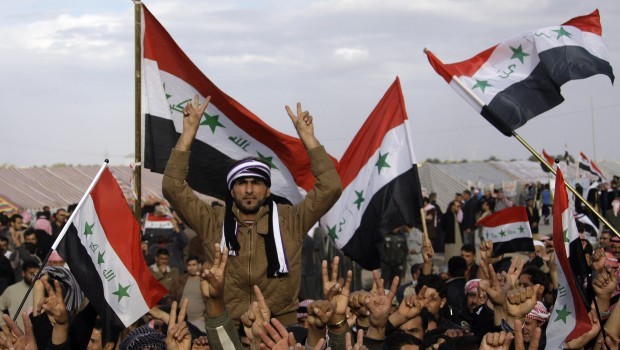
In this Wednesday, Jan. 9, 2013 file photo, protesters chant slogans against Iraq’s Shiite-led government as they wave national flags during a demonstration in Ramadi, Iraq, 70 miles (115 kilometers) west of Baghdad. (AP Photo/Khalid Mohammed, File)
Baghdad, Asharq Al-Awsat—From late 2012 onwards, the predominantly Sunni Anbar province has been the scene of heated demonstrations and unrest, with daily protests against Prime Minister Nuri Al-Maliki’s Shi’ite-dominated government. Despite repeated violent clashes with security forces over the past three months, recently there has been a shift in the demonstrators’ political discourse, stressing the need for peaceful forms of protest. Moreover, although those leading the demonstrations have often called for Prime Minister Maliki to step down, there is now a clear willingness among the Anbar opposition to negotiate directly with the Iraqi government.
Sheikh Hamid Al-Shuka, head of the Anbar tribal council, has revealed that “we have agreed to form an opinion body from among those protesting in Ramadi (the capital of Anbar province). This body will administer all affairs relating to the demonstrations, and make observations regarding all issues concerning Anbar province until the protests come to an end.” Shuka, in exclusive statements to Asharq Al-Awsat, said that “the first task of the opinion body will be to negotiate with the government on the protestors’ demands.” He added, “A delegation will be headed by Ahmed Al-Saadi, son of the prominent Sunni cleric Sheikh Abdul Malek Al-Saadi, and its membership will comprise of a number of jurists and specialists, whether in Ramadi or Baghdad.”
Asked whether the delegation will include some well-known figures from among the protestors, whether members of parliament, politicians, or prominent speakers such as Ahmed Abu Risha, Ali Hatem Suleiman, and Said Lafi, Shuka said: “None of these brothers are members of the delegation. The opinion body agreed that the delegation would include no politicians.” Shuka explained, “The delegation will commence negotiations with the three executive authorities: the government, the judiciary, and the parliament. Its first task is to conduct negotiations with the government within the framework of the demands that have already been raised, as per the agreement of everyone demonstrating in the western provinces.” When questioned on the exact identity of the opinion body, Shuka revealed, “It consists of 26 individuals including eight tribal elders, six religious leaders, six intellectuals, and six of the youth demonstrators.”
For his part, Sheikh Ghassan Ithawi, a member of the popular coordination committee for the demonstrations in Anbar province, told Asharq Al-Awsat that “the demonstrators and their representatives, whether tribal elders or religious leaders, and in coordination with the Sunni position, have agreed to begin negotiations with the government directly, and not through third parties, in order to discuss their demands.” Ithawi added, “The principle of negotiation is well known in politics and while we are negotiating for our legitimate demands, we are not seeking to offer concessions. Rather, we want to know the truth about what the government is doing, and what it claims to have implemented. This is what has prompted us to begin direct negotiations, so that we know exactly what has been achieved, what has not been achieved, and the reasons why.”
